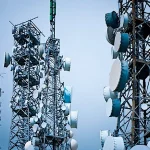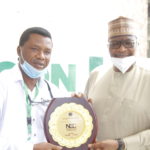SPECIAL: Developmental regulations are NCC’s unique drive towards digital economy – Prof. Danbatta
Professor Umar Garba Danbatta is the Executive Vice Chairman and Chief Executive Officer (EVC/CEO) of the Nigerian Communications Commission. He has served as a lecturer in the Department of...

Professor Umar Garba Danbatta is the Executive Vice Chairman and Chief Executive Officer (EVC/CEO) of the Nigerian Communications Commission.
He has served as a lecturer in the Department of Electrical Engineering, Faculty of Technology of Bayero University Kano for 28 years, where he taught courses in telecommunications engineering and electronics and held academic positions of Dean of the Faculty and Head of Department at different times. His main administrative responsibilities, in the university, included Deputy and Acting Dean of Students’ Affairs, Administrator of the Works Department and later, Director of the Centre for Information Technology (CIT).
Until his appointment as the EVC, Prof. Danbatta served as the Acting Vice-Chancellor of the Kano University of Science & Technology, Wudil.
In this interview with TechTV Networks’ Don Pedro Aganbi as part of the Nigeria@60 ICT Hall of Fame award in partnership with TechEconomy.ng, the EVC delved into the digital economy agenda of Federal Republic of Nigeria, led by His Excellency, Muhammadu Buhari, GCFR. EXCERPTS:
Q: The Coronavirus Pandemic has raved countries across the world, Nigeria inclusive; what is the experience like with regards the telecom industry in Nigeria?
Danbatta: Yes, the Covid-19 pandemic is still very much around. The reality of the pandemic is evident even in our daily dealings. We are compelled to comport ourselves to contain the spread and the general effect of the pandemic. It has also cast attention on the telecommunications industry. The reasons are obvious. A lot of our business activities are now virtual. The next question goes like: Is the telecommunications industry ready to contend with the new realities and going by the demands?
I think, we are not doing badly, because virtual meetings and activities have continued to occur on daily basis. Nevertheless, something needs to be done to maintain or improve on the quality of service (QoS) for better experience. This is what is associated with the industry over the years. We need to do more, especially as the industry is faced with infrastructure deficit. It has always been there, but the increase in demand as occasioned by the pandemic has further exhibited the problems to us to the extent that we need to quickly do something about the infrastructure deficit. That is also an important area that the NCC has to do more and quickly.
Another area is the regulation – when you have the pandemic of this type, the question arises: Do we have the regulatory framework that will address this development in terms of solid infrastructure. Developmental regulations are strategic pillars of the digital economy roadmap launched recently by the Mr. President, Muhammadu Buhari, GCFR.
So, on the other hand, we are trying to see how to deploy ‘regulatory support’ towards growing the infrastructure base of the industry. Also, the regulatory template implies such that can keep faith with what is happening in the sector. We are ensuring the provision of regulatory flexibility and certainty; which attributes have always been association with the Nigerian Communications Commission (NCC).
Q: Nigeria@60: Let’s look at some of the NCC’s success stories; tell us few of them
Danbatta: First, I am looking forward to continuing to add to the numerous achievements we have recorded as a leading telecom regulator on the Continent. Looking back in the last five years and the success we have recorded, I would rather leave it to Nigerians to pass verdict on our performances. It will be uncharitable for me to begin to enumerate our successes in the past five years.
With particular reference to Nigeria’s 60th Independence anniversary, I would like to pass a message of goodwill, fraternity on behalf of the Board and Management of the Nigerian Communications Commission (NCC) to all Nigerians. We should take deep reflections on the past and the present with a view to building a trajectory to the future for economic and social wellbeing of the citizenry. This we can do by leveraging the power of the Information and Communications Technology. So, the policy that has been unveiled by Mr. President is an important document that if implemented will lead to that important destination that we are headed in our journey to digital transformation of the country.
Permit me to explain further: The statistics that we keep reeling out monthly (NCC industry statistics) on mobile voice penetration, internet penetration, broadband penetration, data usage and others, they are elements of the digital economy ecosystem. They are not the ends rather the means to destination. The ends of digital transformation are to build and share sustainable prosperity; to eliminate poverty, improve learning, create a competitive and innovative economy to make the society more open, viable and cohesive. These are some of the elements of the digital economy that we hope to develop for Nigerians to be able to reach the destination.
“We need to develop more ICT applications and introduce institutional changes to attain desired objectives of digital economy policy” – Danbatta
Nigerians will appreciate that some of these are already happening. We are seeing more innovative ideas from the youth; virtual activities taking place and adding value to digital economy. I can say confidently that the future – the post 60th anniversary for Nigeria shows a lot of promise. We are looking forward to participate by showing policies that are relevant to the telecommunications sector.
Q: There is a call for the declaration of National Digital Day in Nigeria as an avenue to draw attention to digital economy. What is your view on that?
Danbatta: Yes, I recall that Chief Leo Stan Ekeh made that important remark. He is a critical stakeholder in the telecommunications sector. And coming from him, I would subscribe to this important observation he made. All citizens are entitled to make such observations and government is expected to listen and pay attention to such observations. I am sure those are responsible to take note of such suggestions will digest it and I believe something will be done.
Someone may ask: What do we intend to achieve by making such declaration? The objectives, I believe, are to enlighten Nigerians about policies, visions, programmes and opportunities in the digital space. Like I have said concerning the Digital Economy roadmap, it will require all Nigerians to participate in the journey.
Also, in reference to the Digital Economy Policy, we have the policy, but do we have enough institutions and the skill sets to support the moves. How do we train people to acquire the necessary skills that will generate that critical mass of ICT adoption and usage.
Thirdly, we need to look at the telecommunication infrastructure towards attainment of the digital economy pursuit.
Fourthly, we need to develop more ICT applications and introduce institutional changes that will lead to the attainment of the desired objectives enshrined in the policy document. These are some of the things the sensitization will address, because the Minister of Communications and Digital Economy, Dr. Isa Ali Ibrahim (Pantami) ensured that relevant agencies – NCC, NITDA, NIGCOMSAT, NIPOST and the Galaxy Backbone, participated during the process of the Digital Economy articulation. The implementation has also been assigned to the five agencies of Government. The NCC is responsible to the implementation of five out of the eight policy pillars.
Also, we have the national broadband plan 2020-2025. There are important milestones that have been assigned to us under the Ministry to ensure the attainment of these goals. For example, the NCC has a set target of 70 per cent broadband penetration to be attained by the year 2025. Nigerians are aware about where we are now, 43.30 per cent. Only recently, the government set a target within the range of the new broadband plan. Ok, what do we intend to achieve by the year 2023 and 60 per cent was the figure that has been assigned to the NCC. There is a reason for that. The terminal date of this administration is 2023.
Therefore, the very convincing case made by Chief Leo Stan Ekeh for a day to be dedicated as National Technology Day is apt.









No Comment! Be the first one.